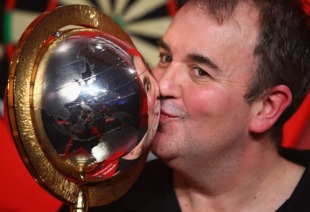- January 13 down the years
A legend makes his first mark
The sporting events of January 13 down the years
1990
Phil Taylor's first world darts title. Eric Bristow, no less, had spotted this unknown newcomer, whose throws were flatter and therefore more accurate than most. He liked what he saw so much that he sponsored Taylor with ten grand of his own money. It was repaid almost immediately; the money as well as the confidence. After thrashing big Cliff Lazarenko 5-0 in the semi-final, Taylor did the same to his sponsor in the final, beating Bristow 6-1.
1969
Stephen Hendry was born in Edinburgh and became the most successful snooker player of the modern era. Seven world titles, including five in a row, from the first year of the 1990s to the last. The youngest champion at 21, he was only 17 when he played in the tournament for the first time. He made a record 16 century breaks in the 2002 event, but lost the final 18-17. He took the safety play and mental edge of Steve Davis (born August 22, 1957), added a more positive approach to long-range potting, and became the complete player. Outside the World Championships, his tournament wins are too numerous to list here.
1957
Mark O'Meara was born in North Carolina. Successful enough on the PGA tour, he had to wait until he was 41 before enjoying the year of his life, when he won two Majors and the World Matchplay. He put his Indian summer down to working with Tiger Woods, the new star who was nearly 19 years younger. Woods must have regarded this late blooming with a rueful smile. He lost to O'Meara by one hole at the World Matchplay and one stroke at the British Open, which the veteran won in a play-off against Brian Watts. O'Meara was superb in tight situations in 1998 - he also took the Masters by one stroke. Just to show he could win by a knockout as well as go the distance, earlier in the World Matchplay he'd thumped defending champion Vijay Singh with ten holes to spare.
1979
The first 147 break in a competitive snooker match. Compiled by former world champion John Spencer against Cliff Thorburn in the Holsten Lager Tournament at the Fulcrum Centre in Slough. It would have been the first televised maximum if the camera crew hadn't gone for a tea break. Quite right too.
1973
The first international rugby match at the revamped Parc des Princes in Paris. France beat Scotland 16-13 despite a try by scrum-half Alan Lawson, who was commentator Bill McLaren's son-in-law, and a drop goal by future Lions coach Ian McGeechan. After only 13 minutes, English referee Ken Pattinson went injured and was replaced by French touch judge François Palmade, an experienced international referee who was later praised for his impartiality.
2002
Tony David became the first Australian to win a world darts title. It was only the BDO version, but not bad for a haemophiliac who walked with a limp, couldn't straighten his throwing arm, and received a disability pension in Australia. A 66-1 outsider at the start of the tournament, David played England's Mervyn King in the final and should have won more easily than he did. He led 5-1, had a dart to win 6-2, three in a row to win 6-3, then three in a row to win 6-4, hitting the last. The following year, he lost 5-0 in the quarter-finals. He underwent a successful liver transplant in 2009.
1948
In a non-title fight, Ezzard Charles stopped Archie Moore in the eighth. That's how good he was - because Moore was arguably the greatest light-heavyweight of the lot. And if anyone were to argue, it would be Charles. He won the world heavyweight title the following year, but he was a natural light-heavy. So this was a fight between the best two of all time. Unarguably?
1985
Otto Bucher of Switzerland hit a hole-in-one on a golf course in Spain. Nothing newsworthy about that. If Herr Bucher hadn't been 99 years old.
1974
The Miami Dolphins won the Super Bowl by beating the poor Minnesota Vikings 24-7. Miami's bruising running back Larry Csonka (born December 25, 1946) was voted MVP for his 145 yards and two touchdowns. The Vikings lost the following year's Super Bowl too, and again in 1977.
1911
Freda James was born Winifred James in Nottingham. After finishing runner-up in the 1933 Wimbledon doubles with Adeline 'Billie' Yorke, she won the title with Kay Stammers in 1935 and 1936.
1975
Bunny Johnson came from Jamaica, so he had to wait ten years before being allowed to fight for a British boxing title. A natural light-heavyweight, he won the British and Commonwealth heavyweight titles on this day by knocking out Danny McAlinden, a crude slugger who'd won the title by flattening Jack Bodell in the second round. Here he went down twice in the ninth and sat on the canvas with his arms out wide before trying to get up too late. Johnson lost the title later that year to Richard Dunn, who was as raw as Danny Mac.
1941
Meinhard Neimer was born in a border town in Poland but competed for East Germany, so make of his achievements what you will. He won three Winter Olympic golds in bobsleigh, retaining the four-man title in 1980 and winning it at the World Championships three years earlier.
1883
Nate Cartmell was born. At the 1904 Olympics, he finished second in the 100 and 200 metres, each time behind Archie Hahn, who also won the 60 metres. At the 1908 Games in London, he won bronze in the 200 and gold at last as a member of the USA's medley relay team, running the second 200 metres leg before the 400 metre men took over. The following year, Cartmell returned to England to win the AAA 220 yards title.

